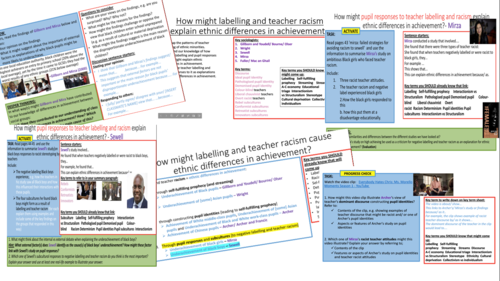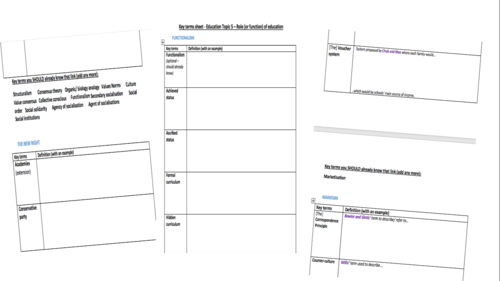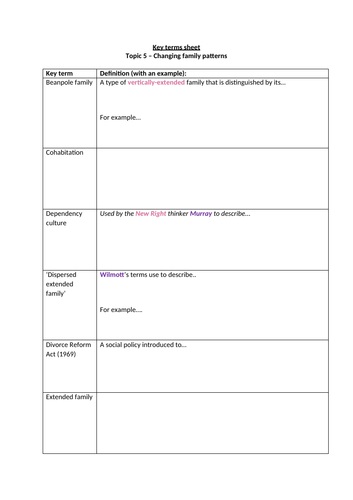
176Uploads
22k+Views
5k+Downloads
Sociology

AQA A-level Sociology: Education Topic 3 Ethnic differences - Negative labelling and teacher racism
Detailed and differentiated (up and down) student led lesson that explores the following so students are able to understand and explain how negative labelling and teacher racism might cause ethnic differences in achievement:
Ideal pupil identity , Pathologised pupil identity, Demonised pupil identity, Colour-blind teachers, Liberal chauvinist teachers, Overt racist teachers, Rebels subcultures, Conformist subcultures, Retreatist subcultures, Innovators subcultures
Differentiates between Gillborn and Youdell (or Bourne or Olser), Sewell, Mirza’s view of how teachers might be racist and how this might affect achievement for different groups.
Lesson makes links to the following terms that students should have covered before completing this lesson: Labelling, Self-fulfilling prophecy, Streaming, Streams A-C economy, Educational triage, Interactionism vs Structuralism, Stereotype, Ethnicity Cultural deprivation Collectivism vs individualism.
**NOTE – Students will need to have basic to reasonable knowledge of labelling and the self-fulfilling prophecy. **
Uses and refers to ’ AQA A Level Sociology Book One Including AS Level: Book one 3rd Revised edition by Rob Webb, Hal Westergaard, Keith Trobe, Annie Townend ’ textbook
RESOURCES CAN BE FOUND AT THE END OF THE PPT.

KEY TERMS SHEET - AQA A-level Sociology Education: Topic 3 Ethnic differences in achievement
Alphabetical key term sheet for AQA A-level Sociology Education Topic 3 ethnic differences in achievement that requires students to fill out the definitions themselves.
*** Includes scaffolding, e.g. some sentence starters (to model to students how to incorporate key sociologists into their definitions) and prompts to help students remember how key term links to the topic. **
*** Includes a section with key terms that students should know from previous learning(links to key terms covered in class differences in achievement, e.g. labelling, pupil identities, material deprivation, speech codes etc) that link to this topic. **
DOES NOT INCLUDE IN TABLE key terms covered in Topic 1 & 2 Class diff key term sheet.
Good form of revision for students and can be used as a revision resource to develop AO1 once filled out.
**BASED ON CONTENT textbook - AQA A Level Sociology Book One Including AS Level: Book one 3rd Revised edition by Rob Webb, Hal Westergaard, Keith Trobe, Annie Townend ’ textbook

KEY TERMS SHEET - AQA A-level Sociology Education: Topic 5 Role of Education
Alphabetical key term sheet for AQA A-level Sociology Education Topic 5 Role of education that requires students to fill out the definitions themselves.
*** Includes some sentence starters to model to students how to incorporate key sociologists into their definitions. **
*** Key terms separated into Functionalist, New Right and Marxist key terms. **
*** Includes a section with key terms that students should know from previous learning (intro to sociological theories and topic 1-4 of education) that link to this topic. **
Good form of revision for students and can be used as a revision resource to develop AO1 once filled out.
**BASED ON CONTENT in textbook - AQA A Level Sociology Book One Including AS Level: Book one 3rd Revised edition by Rob Webb, Hal Westergaard, Keith Trobe, Annie Townend ’ textbook

KEY TERMS SHEET - AQA A-level Sociology Families: Topic 5 Changing family patterns
Alphabetical key term sheet for AQA A-level Sociology Family Topic 5 Changing family patterns that requires students to fill out the definitions themselves. Includes some sentence starters for more difficult key terms.
**Good form of revision for students and can be used as a revision resource to develop AO1 once filled out. **
**BASED ON CONTENT in textbook - AQA A Level Sociology Book One Including AS Level: Book one 3rd Revised edition by Rob

AQA/GCSE Sociology- Independent schools vs State schools
Detailed lesson with lots of scaffolding based on adaptive teaching that help students understand independent schools vs state schools.
Cover the following key terms: Independent schools, Private schools, National curriculum, State-funded school
Covers the following sociologists: The Sutton trust (2011)
ANSWERS TO MOST ACTIVITIES INCLUDED
Key terms you SHOULD know that link: State schools, Independent/ private schools, national curriculum, Public school (extension), Admission policy (extension), Marxism.

AQA A-level Sociology: Education Topic3 Ethnic differences -Material factors and racism
Detailed and differentiated (up and down) student led lesson on how a. material deprivation and b. racism in wider society might cause ethnic differences in achievement. Makes reference to key terms material vs cultural factors, external vs internal factors, the meaning/ patterns of ethnic differences in achievement.
Uses and refers to ’ AQA A Level Sociology Book One Including AS Level: Book one 3rd Revised edition by Rob Webb, Hal Westergaard, Keith Trobe, Annie Townend ’ textbook
RESOURCES CAN BE FOUND AT THE END OF THE PPT.
ANSWERS FOR MAIN ACTIVITIES CAN BE FOUND ON NEXT SLIDE AFTER ACTIVITY SLIDE
INCLUDES ORACY ACTIVITY

Family - Functions of the family (Parsons)
Answer to some activities included
Teaching to all activity include
No starter activity included
Key term and definition sheet for the lesson included

AQA GCSE Sociology: Families - Power in the family
Detailed lesson with lots of scaffolding based on adaptive teaching that help students understand how might power be divided in families.
Cover the following key terms: Conjugal relationships, Power
Cover the following key sociologists: Edgell, Pahl, Opinium Research, survey
Starter activity enables students to recap content they should or might have learnt before this lesson within the families unit
ANSWERS TO ALL ACTIVITIES INCLUDED
REQUIRES OWENS AND WOODFIELD AQA GCSE TEXTBOOK FOR MAIN ACTIVITIES (OR ANY EQUIVALENT INFORMATION ON DECISION MAKING AND MONEY MANAGEMENT IN THE FAMILY)
Includes icons for visual learning
RESOURCES CAN BE FOUND AT THE END OF THE PPT
Includes a discussion activity with lots of scaffolding
Includes a 3 marker with detailed scaffolding and a student friendly mark-scheme

AQA GCSE Sociology: Education- Feminists’ role of education
Detailed lesson with lots of scaffolding based on adaptive teaching that help students understand Feminists’ role of education.
Covers the following key terms: Secondary socialisation, role allocation, meritocracy correspondance principles, specialist skills, universalistic standards, particularistic standards, ascribed status, achieved status, social cohesion, gender differences in subject.
Includes a ‘teaching to all’ activity
Starter activity enables students to recap the feminist view of society
ANSWERS TO MOST activities included
Includes an activity that allows students to compare and contrast functionalist, Marxist and feminist views of the role of education
Promotes a spiral curriculum by making links to key terms that students might have previously been taught that link to this lesson

AQA GCSE Sociology: Education- Class differences in achievement (Labelling)
Detailed lesson with lots of scaffolding based on adaptive teaching that help students understand class differences in achievement.
Covers the following key terms: Labelling, Self-fulfilling prophecy/Pygmalion effect, the ‘Halo effect’
Covers the following sociologists: Becker, Rosenthal and Jacobson
Includes key term and definition sheet needed for the lesson.
Includes a discussion activity to promote oracy and engagement
includes a 3 marker and detailed scaffolding to help students answer it. Also includes a student-friendly marker for self or peer assessment.
ANSWERS FOR MOST ACTIVITIES INCLUDED
Promotes a spiral curriculum by making links to key terms that students might have previously been taught that link to this lesson.
Resources can be found at the end of the PPT

Sociology Education Class differences in achievement- Cultural capital
Detailed lesson with lots of scaffolding based on adaptive teaching that help students understand
Cover the following key terms
Covers the following sociologists
Activities require pages from the AQA A Level Sociology Book One Including AS Level: Book one 3rd Revised edition by Rob Webb, Hal Westergaard, Keith Trobe, Annie Townend
ANSWERS TO MOST ACTIVITIES INCLUDED
Makes references to key terms students should know- Promotes a spiral curriculum by making links to key terms that students might have previously been taught that link to this lesson.
RESOURCES CAN BE FOUND AT THE END OF PPT

AQA GCSE Sociology: Family- Changes in Family Relationships
Detailed lesson with lots of scaffolding based on adaptive teaching that help students understand changes in family relationships.
Covers the following key terms: Kin, Kinship, Extended kin, Democratic relationships, Child cantered, Infant morality.
Covers the following sociologists:Young & Wilmott, Aries, Shorter, 1918 Education Act, Brannen, Pyror and Tinder, Charles et al (2008a.), Charles et al (2008b.), Bhatti
Makes references to key terms students should know- Promotes a spiral curriculum by making links to key terms that students might have previously been taught that link to this lesson.
Starter is keyword bingo and requires teacher to know the definitions of key terms previously learnt in the family unit.
ANSWERS TO SOME ACTIVITIES INCLUDED
RESOURCES CAN BE FOUND AT THE END OF THE PPT

AQA GCSE Sociology- Research methods-Official and non-official statistics
Detailed lesson with lots of scaffolding based on adaptive teaching that help students understand the difference between official and non-official statistics, the advantages and disadvantages of using official and non-official statistics to investigate sociological issues or topics.
Key terms included: Official statistics, non- official statistics
Key terms and studies you should know what link: The Millenium Cohort Study (MCS)– The British Cohort Study (BCS) - Secondary vs primary methods and data – Data - Quantitative vs qualitative data
Answers to main activities included
includes key term and definition sheet for the lesson
Resources can be found at the end of the PPT

AQA GCSE Sociology- Research Methods - Case studies
Detailed lesson with lots of scaffolding based on adaptive teaching that help students understand how to describe a case study and how it might be used to investigate sociological issues, explain the advantages and disadvantages of using a case study to investigate sociological issues.
Covers the following key terms: Case study, Mixed methods, Triangulation
Key terms and studies you should know that link: Secondary vs Primary methods and data, data, Quantitative vs Qualitative data
Resources can be found at the end of the PPT
Answers to all activities
Includes key term and definition sheet for the lessons

AQA GCSE Sociology: Family- Explaining the increase in divorce
Detailed lesson with lots of scaffolding based on adaptive teaching that explain the increase in divorce.
Includes a 4 marker with detail scaffolding to help students answer it. Includes a student-friendly mark scheme for self or peer-assessment.
Includes two versions of the table needed for the carousel activity - one with scaffolding and one without
Covers the following key terms: Secularisation, Stigma, Empty shell marriage
Covers the following sociologists: Office for National Statistics (ONS), Dennis , Fletcher, Hart, Goode, 1969 Divorce Reform Act, Mitchell & Goody
Covers the following key terms you should already know: Function (of an instituition), Individualism, Collectivism, Contemporary society, Consumerism/ Consumption
ANSWERS TO SOME MAIN ACTIVITIES INCLUDED
Makes references to key terms students should know – Promotes a spiral curriculum by making links to key terms that students might have previously been taught that link to this lesson.
RESOURCES CAN BE FOUND AT THE END OF PPT

AQA GCSE Sociology: Family - Feminist functions of the family
Includes 4 marker ‘perspective question’ on Delphy and Leonard with scaffolding to help students answer this question and others like
Includes ‘teaching to all’ activity that develops students ability to draw on the sociological perspectives and ideas they have learnt to answer 12 markers.
Includes scaffolding to help students write a paragraph for a 12 marker using what they have learnt in the lesson on Delphy and Leonard’s view of the functions of the family.
ANSWERS TO MOST ACTIVITIES INCLUDED

AQA GCSE Sociology - Research Methods: How might sociologist select their sample?
Detailed lesson with lots of scaffolding based on adaptive teaching that help students understand how might sociologist select their sample for sociological research (e.g. the sampling method, consequences sampling methods may have on social research, the different types of sampling methods and how they are used.
Covers the following key terms: Target population, Sample, Sampling frame, Probability (or random sampling) vs Non-probability sampling, Simple random sampling, Systematic random sampling, Stratified random sampling, Snowball sampling, Quota sampling, Representative sample vs unrepresentative sample, Generalise; Generalisability; To make generalisations, Opportunity sampling extension), Cluster sampling (extension) and Positivists vs interpretvivists (extension)
Answers to most activities are included

AQA GCSE Sociology - Research Methods: How do sociologists collect their data?
Detailed lesson with lots of scaffolding based on adaptive teaching that help students understand how sociologist collect data for sociological research (e.g. difference between primary and secondary methods, quantitative and qualitative data, the strengths and weaknesses of primary and secondary methods, standardisation and social process
Covers the following key terms: research methods, sociological research, data, research process, Primary methods vs Secondary Methods, qualitative vs quantitative data, closed vs open questions, validity and reliability.
Answers to all main activities included
Resources can be found at the end of the PTT

AQA A-level Sociology: Education Topic 3 Ethnic differences Revision
Detailed and differentiated (up and down) student led lesson that:
uses scaffolding to guide students in making a mind-map of the topic as a revision material
-recaps the success criteria for 10 markers with item
-provides a model paragraph for a 10 marker item on this topic
-uses scaffolding to help students write their own 10 mark (item) paragraphs or full answers.
-includes 4 different 10 markers (with item). for this topic
NOTES -RESOURCES CAN BE FOUND AT THE END OF THE PPT.

L5 AQA A-level Families- Couples: Domestic violence
Detailed and differentiated (up and down) student-led lesson that examines and analyses the following key terms to examine patterns and explanations of domestic violence: Domestic violence/ abuse, Radical feminists, Materialism,
Marxist feminism, Radical feminist explanation (of domestic violence)
Marxist feminist explanation (of domestic violence),Materialist explanation (of domestic violence)
Examines the views of the following sociologists: Dobash and Dobash, Millet and Firestone, Wilkinson and Pickett, Ansley
***** Makes reference to other key terms students might know that link. **
***** ANSWERS to MAIN activities INCLUDED****
Uses and refers to ’ AQA A Level Sociology Book One Including AS Level: Book one 3rd Revised edition by Rob Webb, Hal Westergaard, Keith Trobe, Annie Townend ’ textbook




















